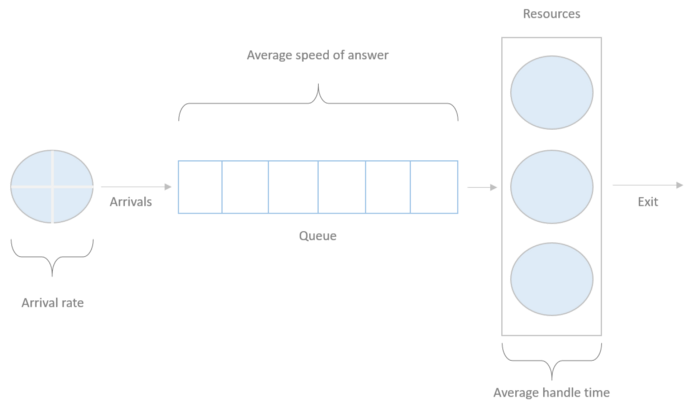
Research
Malicious npm Packages Impersonate Flashbots SDKs, Targeting Ethereum Wallet Credentials
Four npm packages disguised as cryptographic tools steal developer credentials and send them to attacker-controlled Telegram infrastructure.
Standard tools for workforce management, queuing, scheduling, rostering and optimization problems.
Make sure to check the documentation, which is available here
Install pyworkforce
It's advised to install pyworkforce using a virtual env, inside the env use:
pip install pyworkforce
If you are having troubles with or-tools installation, check the or-tools guide
For complete list and details of examples go to the examples folder
pyworkforce currently includes:
It solves the following system resource requirements:

It finds the number of resources to schedule in a shift based on the number of required positions per time interval
(found, for example, using queuing.ErlangC), maximum capacity restrictions and static shifts coverage.
It assigns a list of resources to a list of required positions per day and shifts; it takes into account different restrictions as shift bans, consecutive shifts, resting days, and others. It also introduces soft restrictions like shift preferences.
A brief introduction can be found in this medium post
from pyworkforce.queuing import ErlangC
erlang = ErlangC(transactions=100, asa=20/60, aht=3, interval=30, shrinkage=0.3)
positions_requirements = erlang.required_positions(service_level=0.8, max_occupancy=0.85)
print("positions_requirements: ", positions_requirements)
Output:
>> positions_requirements: {'raw_positions': 14,
'positions': 20,
'service_level': 0.8883500191794669,
'occupancy': 0.7142857142857143,
'waiting_probability': 0.1741319335950498}
If you want to run different scenarios at the same time, you can use the MultiErlangC, for example, trying different service levels:
from pyworkforce.queuing import MultiErlangC
param_grid = {"transactions": [100], "aht": [3], "interval": [30], "asa": [20 / 60], "shrinkage": [0.3]}
multi_erlang = MultiErlangC(param_grid=param_grid, n_jobs=-1)
required_positions_scenarios = {"service_level": [0.8, 0.85, 0.9], "max_occupancy": [0.8]}
positions_requirements = multi_erlang.required_positions(required_positions_scenarios)
print("positions_requirements: ", positions_requirements)
Output:
>> positions_requirements: [
{
"raw_positions": 13,
"positions": 19,
"service_level": 0.7955947884177831,
"occupancy": 0.7692307692307693,
"waiting_probability": 0.285270453036493
},
{
"raw_positions": 14,
"positions": 20,
"service_level": 0.8883500191794669,
"occupancy": 0.7142857142857143,
"waiting_probability": 0.1741319335950498
},
{
"raw_positions": 15,
"positions": 22,
"service_level": 0.9414528428690223,
"occupancy": 0.6666666666666666,
"waiting_probability": 0.10204236700798798
}
]
A brief introduction can be found in this medium post
from pyworkforce.scheduling import MinAbsDifference, MinRequiredResources
# Rows are the days, each entry of a row, is number of positions required at an hour of the day (24).
required_resources = [
[9, 11, 17, 9, 7, 12, 5, 11, 8, 9, 18, 17, 8, 12, 16, 8, 7, 12, 11, 10, 13, 19, 16, 7],
[13, 13, 12, 15, 18, 20, 13, 16, 17, 8, 13, 11, 6, 19, 11, 20, 19, 17, 10, 13, 14, 23, 16, 8]
]
# Each entry of a shift,an hour of the day (24), 1 if the shift covers that hour, 0 otherwise
shifts_coverage = {"Morning": [0, 0, 0, 0, 0, 1, 1, 1, 1, 1, 1, 1, 1, 0, 0, 0, 0, 0, 0, 0, 0, 0, 0, 0],
"Afternoon": [0, 0, 0, 0, 0, 0, 0, 0, 0, 0, 0, 0, 0, 1, 1, 1, 1, 1, 1, 1, 1, 0, 0, 0],
"Night": [1, 1, 1, 1, 1, 0, 0, 0, 0, 0, 0, 0, 0, 0, 0, 0, 0, 0, 0, 0, 0, 1, 1, 1],
"Mixed": [0, 0, 0, 0, 0, 0, 0, 0, 0, 1, 1, 1, 1, 1, 1, 1, 1, 0, 0, 0, 0, 0, 0, 0]}
# Method One
difference_scheduler = MinAbsDifference(num_days=2,
periods=24,
shifts_coverage=shifts_coverage,
required_resources=required_resources,
max_period_concurrency=27,
max_shift_concurrency=25)
difference_solution = difference_scheduler.solve()
# Method Two
requirements_scheduler = MinRequiredResources(num_days=2,
periods=24,
shifts_coverage=shifts_coverage,
required_resources=required_resources,
max_period_concurrency=27,
max_shift_concurrency=25)
requirements_solution = requirements_scheduler.solve()
print("difference_solution :", difference_solution)
print("requirements_solution :", requirements_solution)
Output:
>> difference_solution: {'status': 'OPTIMAL',
'cost': 157.0,
'resources_shifts': [{'day': 0, 'shift': 'Morning', 'resources': 8},
{'day': 0, 'shift': 'Afternoon', 'resources': 11},
{'day': 0, 'shift': 'Night', 'resources': 9},
{'day': 0, 'shift': 'Mixed', 'resources': 1},
{'day': 1, 'shift': 'Morning', 'resources': 13},
{'day': 1, 'shift': 'Afternoon', 'resources': 17},
{'day': 1, 'shift': 'Night', 'resources': 13},
{'day': 1, 'shift': 'Mixed', 'resources': 0}]
}
>> requirements_solution: {'status': 'OPTIMAL',
'cost': 113.0,
'resources_shifts': [{'day': 0, 'shift': 'Morning', 'resources': 15},
{'day': 0, 'shift': 'Afternoon', 'resources': 13},
{'day': 0, 'shift': 'Night', 'resources': 19},
{'day': 0, 'shift': 'Mixed', 'resources': 3},
{'day': 1, 'shift': 'Morning', 'resources': 20},
{'day': 1, 'shift': 'Afternoon', 'resources': 20},
{'day': 1, 'shift': 'Night', 'resources': 23},
{'day': 1, 'shift': 'Mixed', 'resources': 0}]}
FAQs
Common tools for workforce management, schedule and optimization problems
We found that pyworkforce demonstrated a healthy version release cadence and project activity because the last version was released less than a year ago. It has 1 open source maintainer collaborating on the project.
Did you know?

Socket for GitHub automatically highlights issues in each pull request and monitors the health of all your open source dependencies. Discover the contents of your packages and block harmful activity before you install or update your dependencies.

Research
Four npm packages disguised as cryptographic tools steal developer credentials and send them to attacker-controlled Telegram infrastructure.

Security News
Ruby maintainers from Bundler and rbenv teams are building rv to bring Python uv's speed and unified tooling approach to Ruby development.

Security News
Following last week’s supply chain attack, Nx published findings on the GitHub Actions exploit and moved npm publishing to Trusted Publishers.